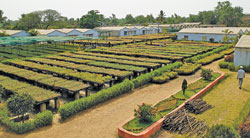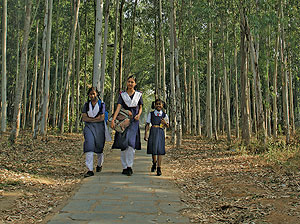 |
| |
Unit |
06 - 07 |
07 - 08 |
08 - 09 |
CO2 emissions
(Manufacturing & Freight) |
KT |
1143 |
1352 |
1572 |
| CO2 sequestered |
KT |
2025 |
2638 |
3695 |
| CO2 sequestered |
Percent |
177 |
195 |
235 |
|
CO2 Emissions & Sequestration
Total CO2 (equivalent) emissions from ITC businesses in 2008-09 amounted to 1,572 kilo tonnes up from 1,352 kilo tonnes last year. Higher CO2 emission was on account of significant growth in production, change in product mix, large project activities and addition of new businesses in the reporting boundary.
ITC’s farm and social forestry initiatives added nearly 9,975 hectares of plantations during
2008-09. Total plantations, as on March 31, 2009, covered over 90,000 hectares.
The Company's social & farm forestry initiative has not only contributed to sustainable source of raw material for the Paperboards business, but also helped sequester 3,695 kilo tonnes of CO2, thus consolidating ITC’s status as a 'Carbon Positive Company' for the fourth year in a row.
Sustainable Sourcing of Wood Fibre
 ITC’s Paperboards mill at Bhadrachalam manufactured over 360,908 tonnes of paperboards in 2008-09, using 532,254 tonnes of pulpwood, apart from waste paper and some special pulp. This pulpwood is sourced largely from renewable plantations in agricultural lands and private wastelands owned by farmers, and does not deplete natural forests. ITC’s Paperboards mill at Bhadrachalam manufactured over 360,908 tonnes of paperboards in 2008-09, using 532,254 tonnes of pulpwood, apart from waste paper and some special pulp. This pulpwood is sourced largely from renewable plantations in agricultural lands and private wastelands owned by farmers, and does not deplete natural forests.
ITC has invested significantly in research & development, over many years, to create clonal saplings of Eucalyptus, Subabul and Casuarina, which are largely disease-resistant, grow faster with reduced growing cycles, and have higher survival rates. These are then provided to small farmers for planting in private wastelands. These clones, popularly known as ‘Bhadrachalam clones’, have been developed following a traditional breeding route and are not genetically modified. ITC also provides a comprehensive package of plantation management practices under the Tree Improvement Programme to assist growers. The pulpwood species of Eucalyptus, Subabul, and Casuarina are exotics and are not sourced from high value conservation forests. The Government of Andhra Pradesh has declared Eucalyptus, Subabul and Casuarina as agricultural produce.
The forestry initiatives have brought with it a multiplicity of additional benefits apart from conserving natural forest resources. These include the creation of a green cover for carbon sequestration, conserving in-situ moisture, groundwater recharge, reduction in topsoil losses and increase in soil fertility. More importantly, it has provided 40 million mandays of employment to tribals and marginal farmers, many of whom are among the most disadvantaged.
Over 98.7% of the Bhadrachalam mill's total wood requirement in 2008-09 came from plantations under the agro-forestry initiatives. Around 6,240 tonnes of bamboo was sourced from authorized open markets. A small portion amounting to 4,263.13 tonnes of wood (0.53%) was sourced from private farmlands. The mill also utilized 40,194 tonnes of waste paper.
The Bhadrachalam mill which is ISO 9001-2000 certified, ensures traceability of all the wood used in the manufacturing process and does not buy wood-based raw materials from unidentified sources. |